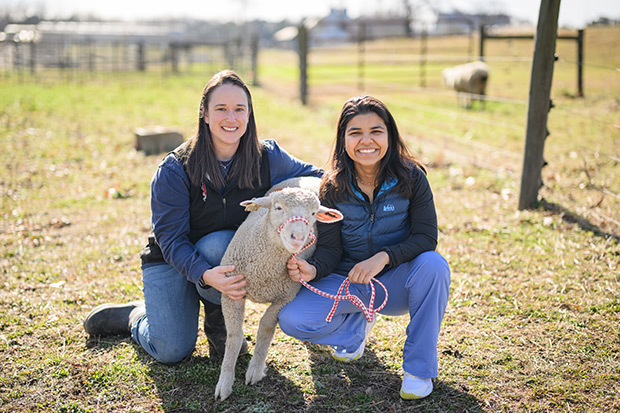AVMF, VPRF pharmacology grant recipients undertake research projects
For the first time, the American Veterinary Medical Foundation (AVMF) and Veterinary Pharmacology Research Foundation (VPRF), have awarded grants supporting research projects improving the health and welfare of sheep, pigeons, and cheetahs.
The AVMF and VPRF selected three veterinary researchers as recipients of the organizations’ 2023-24 pharmacology research grants. This funding supports research projects developed to advance the prevention, diagnosis, and treatment of diseases in animals.
Dr. Danielle Mzyk
Dr. Mzyk is a field service clinical veterinarian in the Department of Population Health and Pathobiology at North Carolina State University College of Veterinary Medicine.
Dr. Mzyk’s research project received $29,686 to identify drug absorption and distribution differences in wool versus hair sheep using the recently approved, nonsteroidal anti-inflammatory drug flunixin. Due to the variability of breeds of sheep across the U.S., there is a critical need to evaluate the efficacy of transdermal flunixin across different coat types. In addition, her research group will use information from pressure sensor mat gait analysis and algometry to develop ways to evaluate pain in clinical patients.
“We are thrilled to have the support of the AVMF/VPRF to gain further understanding of treatment options for relieving pain in sheep. Our research group will be able to investigate key factors in the treatment of pain across different breeds of sheep that are clinically affected by foot rot, a painful infection of the hoof,” Dr. Mzyk said. “Ultimately, we hope that our study will help improve the understanding of pain mitigation in sheep and encourage the development of effective pain management protocols with veterinarians and producers.”
Dr. Stephen J. Divers
Dr. Divers is a professor of zoological medicine at the University of Georgia College of Veterinary Medicine.
His research project received $8,900 and is focused on finding a safer option for sedating birds in clinical practice. Alpha-2 adrenergic agonists that are commonly used can cause negative side effects that impair heart function and breathing during sedation.
The study aims to determine if Zenalpha, a drug combination of medetomidine and vatinoxan hydrochlorides indicated for dogs, has fewer heart and respiratory side effects compared to a traditional alpha-2 adrenergic agonist when used in pigeons. This will be done by comparing the heart rate and character, breathing pattern, and sedation depth between pigeons that received an injection of Zenalpha versus pigeons that received an injection of dexmedetomidine.
“We are so grateful for this grant awarded by AVMF and VPRF to fund our research to study a new sedation medication (Zenalpha) in pigeons. Our hope is that this research will advance the options for safe sedation in birds, and open the door to evaluation of this medication in common pet birds for use in daily clinical practice,” Dr. Divers said.
Dr. Melanie Peel
Dr. Peel is a zoological medicine resident at the University of California-Davis, in collaboration with the San Diego Zoo Wildlife Alliance.
Her research received $3,000 and will assess sedative effects and evaluate the blood levels and metabolism in African cheetahs after giving a dose of gabapentin. African cheetahs from multiple zoological institutions will each be given an oral dose of gabapentin administered at two different dosages. The results of this study will provide a better understanding of the most appropriate dosages and the level of sedation that occurs with the use of gabapentin in this species.
“The gracious support of the AVMF/VPRF is vital to the success of our research and their contribution will allow us to finish the final steps necessary to complete our study. The results of this research will provide the zoological medicine community with much-needed pharmacokinetic knowledge that will help improve the quality of veterinary medicine provided to large exotic cats, like cheetahs,” Dr. Peel said.


